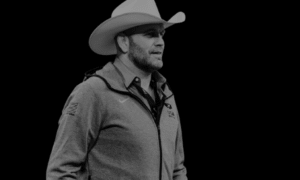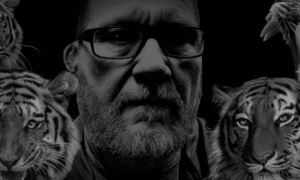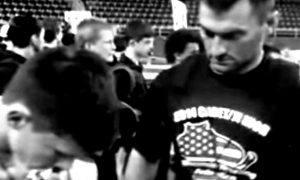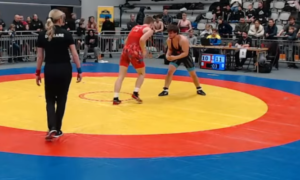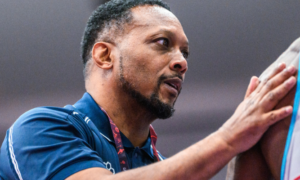Five Point Move is proud to host US Greco-Roman National Team Head Coach Matt Lindland every week for “Coach Lindland’s Report.” For fans and wrestlers looking for insights regarding the US Greco National Team, we ask Coach Lindland questions pertaining to recent events, training, and other topics surrounding the sport of Greco-Roman. If you have any questions you’d like us to ask going forward, let us know via Facebook, Twitter, or through our Contact page.
With a title as strange as the one for this week’s Coach Lindland’s Report, there are bound to be questions. It’s actually all really simple. For this week, love was on Lindland’s mind, but maybe not how you might think. Loving your teammates and loving the sport are vital components to success from the coach’s perspective and since he places such a high importance on those values, we broached the subject. But before that, it’s all about the current US Greco-Roman March European Tour. What Coach Lindland is looking forward to the most along with his own experiences traveling during his competitive days are part of the picture. There is some other stuff mixed in, as well. Have at it!
5PM: What are you looking forward to most about the upcoming slate of events overseas?
Coach Matt Lindland: I’m very much looking forward to seeing these athletes back on the mat. Especially guys like RaVaughn (Perkins), who we hadn’t seen in a while, Robby (Smith), who we haven’t seen since the Olympics, and I’m really looking forward to seeing where we’re at. I know how we’re looking in training, they all look phenomenal. But we’re not competing against the best guys in the world, we’re just competing against other guys in our practice room right now. So I’m looking forward to seeing these guys on the mat and where everybody is at.
5PM: I’ve asked some of your more experienced athletes this question and now I’m asking you — for these tours, what is the most important component, the camps or the events? Or does that answer change depending on the circumstances?
ML: Well, I think that answer would change depending on where we’re at in the season. But I think right now, both are equally important at this time. I want to see our guys compete, I want to see them get on the mat and do what they do. But I also want to see them get some great training in and this one is two tournaments and only a week of training, though some of our athletes will head on to Hungary afterwards and get an extra two weeks of training. Fortunately, we have some really great clubs that help our athletes get to these training camps. Because we’re taking a big delegation and getting a lot of guys overseas, so the more time overseas, the more expensive it is and the more guys you take, the more expensive it is. So we’re bringing more guys and keeping our trip a little short, only 11 days, but some of our athletes are heading to Hungary afterwards for a two-week training camp. Some will come back after the camp and stay for that tournament, as well.
5PM: For you personally, how did you view trips like this overseas when you were competing?
Coach Matt Lindland: (Laughs) As an athlete, I was always looking to go where guys who could beat me were going. Or where guys who medaled at the World and Olympic Games, I was going to find those guys. I was chasing them down. But I think that is a different answer at different times in my career. At the end of my career, I was trying to find the best guys and beat them. Earlier in my career, I was just trying to get as many matches and experience as I could and especially, those training camps, because you don’t have those opportunities here in the US. You won’t get the feel of what European training partners are like day in and day out. So earlier in my career, I think I felt like yeah, These camps are essential to get to. The tournaments are good and I want to beat some good guys and I’m going to run into (Mnatsakan) Iskandaryan or (Józef )Tracz, or somebody good. And then like I said, at the end of my career, it was like, I’m chasing those guys down. Iskandaryan retired, you know, but some of the other guys were still around. I was chasing (Bakhtiyar) Baisetov, and (Filiberto) Azcuy. I wanted to get the guys who had been to the top, I wanted to beat them. So different times in my career, different goals.
5PM: Last year, you put out a valuable blog post talking about attitude towards competition and pressure. A line from that post said “Adding pressure does not make athletes compete better.” Is that something you have to constantly remind athletes about, especially when spotlight events start approaching?
ML: I think that is something you have to remind athletes about and as an athlete, it is something you have to remind yourself about because we want to win. It’s why we’re doing this, you want to be the best in the world. I can see that in my athletes. They want to be great. They don’t want to be just World and Olympic champions, they want to be multi-time champions. They have big goals and big expectations of themselves, so that pressure is already there. As a coach, your job is to remind them, You’re just wrestling. This is fun, this is what you love to do. And as an athlete, you have to remind yourself of that.
We just started working with the Zanettis (Gene and Jeff) and the Wrestling Mindset training this year and the guys have really responded to it, they like their approach. We work with Gene, the guys really like his approach. The guy has a Masters degree in psychology, he’s not a doctor or anything, he’s probably not the most trained psychologist, but he’s the most trained psychologist who knows wrestling. And I think that is what the guys are responding to. He has been through the same kind of feelings, it doesn’t matter if it’s the high school, college, or Senior level. At any level, you still want to win, you still put that pressure on yourself. You still have those same emotions going into matches.
We’ve been working with Gene on that kind of stuff. Personally, why I like working with the Mindset guys is that we share the same philosophies. They’re not giving my athletes a different message. It’s consistent. Whether I’m saying it, Momir (Petković) is saying it, or the Mindset guys are saying it, it’s the same message. I think it is really important to remember why we’re doing this — because it’s fun and we love to compete, so go out there and do those things. Don’t go out there and go, I tell ya, I’ve got to win! You can just feel yourself tense up when you say those two different lines — I love to compete, I’m going to have so much fun, as opposed to, I’ve got to go win. Those are two completely different emotions and I want our guys to remember why they’re doing this, because it’s fun and they love to compete. And that is when they really perform their best anyway.
5PM: People are often afraid to throw the word “love” around, as if it automatically comes with a pseudo-romantic connotation when in my view, love is the most powerful force in the universe. It’s what God gives to us. Love is why you’re able to achieve things. As a coach, how do you spread a message of love in terms of competition, teamwork, and overall unity?
Coach Matt Lindland: I think love is essentially one of the most powerful forces in the world. It’s what God gives us and in the Bible, they talk about many different kinds of love. There is brotherly love, romantic love, agape love, which is love for God and God’s love for man. There are many different kinds of love. The love I’m speaking of is brotherly love. When we talk about paddling the boat, which we’ve discussed a lot at great length and is our theme, to get those six athletes in the boat working together and in-sync, when we talk about that we have to have a vessel. Our vessel is the raft, which represents the sacrifice we make, the team makes, the coaches make, the athletes make. It is the sacrifice. And the acronym we use for R.A.F.T. starts with responsibility. You have to be responsible for your own actions and understand those actions and their consequences. You have to think of others. That’s love (laughs). You have to think about your brothers, your teammates. If I do this, how does it affect my team, how does it affect our program?
The first thing I talk about is responsibility, the “R” in raft. The next thing is the actions, the “A”, what actions are you going to take, good or bad? If I take this action, I’m going to get this result. If I do this action I’m going to get some other result. What actions are you going to take? Again, if you take actions out of love, it is going to make sense. Then family, the “F” in R.A.F.T. When you say “family”, well, what does that mean? It’s very cliché in sports, so you have to define it. So it’s “F”, forget about me, how do I love you? It’s not a romantic love, it’s a brotherly love. I care about you, I want you to have as much success as I have. If you have success, I’m not losing success. You’re not taking something I’m not going to get. We’re in different weight categories. Even if we’re at the same weight, You beat me out, I love you brother, so go represent our country and win that medal this year, I’m going to be your training partner.
I’ve had guys who didn’t make Olympic teams but they were so valuable because they loved their teammates. When I was competing, those guys, that was their character, that’s who they are, and it is really important in what we’re trying to do. We’re not just developing great wrestlers and athletes, we’re developing great men who can reach their full potential in their character.
In the acronym, that last letter is “T”, which is trust. We have to trust one another. In a family, you love your family members and you have to trust each other. Sometimes that trust gets broken and we have to repair it, but it takes a LOT longer to build trust than it does to remove it. That’s why you have to be careful and be responsible and think about your actions. And when you think about the team, think of it like a family. That’s why I think it is really important. If you understand why you’re doing this and you love what you are doing. Nietzsche had a quote that said, “A person who has a why to live by can bear almost any how.” When we’re training and competing, you have huge highs and huge lows, but you’ve got to remember the why to live by, which is, I love what I’m doing and I’m grateful to wrestle every day. I’m grateful I get to live at the Olympic Training Center and my job is to work out and do what I love to do.
So, that’s love. That’s what we’re talking about when we’re talking about love.
Be sure to follow Coach Matt Lindland on Facebook, Twitter, and his official blog for updates on the US Greco Roman Wrestling program heading into the new competitive cycle.



